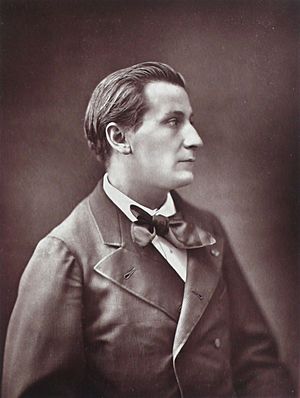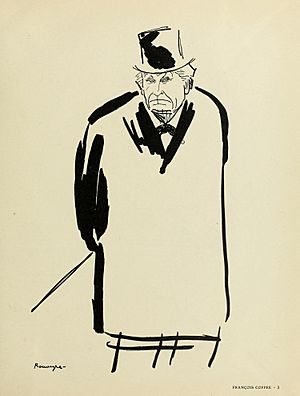François Coppée facts for kids
Quick facts for kids
François Coppée
|
|
|---|---|

François Coppée, by Nadar, c. 1880.
|
|
| Born | François Edouard Joachim Coppée 26 January 1842 Paris, France |
| Died | 23 May 1908 (aged 66) Paris, France |
| Occupation | Writer |
| Nationality | French |
| Signature | |
 |
|
François Coppée (born January 26, 1842 – died May 23, 1908) was a famous French writer. He was known for his poems and stories.
Contents
A French Writer's Life
François Coppée was born in Paris, France. His father worked for the government. He went to school at Lycée Saint-Louis. Later, he worked as a clerk in the war department.
He became popular as a poet who belonged to the Parnassian school. This group of poets focused on perfect form and beauty in their writing. His first poems were published in 1864. In 1869, his collection of poems called "Poèmes modernes" became very successful. One famous poem from this collection was La Grève de forgerons (The Strikers).
In the same year, Coppée's first play, Le Passant (The Passerby), was performed. Famous actress Sarah Bernhardt starred in it. His plays Fais ce que dois (Do What You Must, 1871) and Les Bijoux de la délivrance (The Jewels of Deliverance, 1872) were also popular. These short plays were inspired by the Franco-Prussian War.
After working in the senate library, Coppée became an archivist for the Comédie Française in 1878. This is a very famous French theater. He held this job until 1884. In that year, he was chosen to join the Académie française. This is a very important group of people who protect the French language. After joining, he retired from his public jobs. He was also honored with the Legion of Honour in 1888.
Coppée was known as le poète des humbles (the poet of the humble). His writing often showed simple emotions, love for his country, the joy of young love, and sympathy for poor people. He continued to write plays, mostly serious dramas in verse. Some were written with another writer, Armand d'Artois. One play, Le Pater, was about a short event during the Commune. The government stopped it from being performed in 1889.
Coppée published his first prose work in 1875. He wrote short stories, a book about his childhood, and many short articles. His book La Bonne Souffrance (Good Suffering) was a popular story about him returning to the Roman Catholic Church. He became religious again after a serious illness.
Coppée was also interested in public affairs. He joined a strong Nationalist movement. This group believed in putting their country first. He took a leading part against Alfred Dreyfus in the Dreyfus affair. This was a big political scandal in France. He helped start the Ligue de la patrie française. This group wanted to show that not everyone at the university supported Dreyfus.
What Others Thought of His Work
Some other writers had different opinions about Coppée's poetry.
The poet Arthur Rimbaud wrote many funny parodies of Coppée's poems. A parody is a humorous imitation of a serious piece of writing. Rimbaud's parodies made fun of Coppée's writing style. Coppée's style was known for its "chatty comfortable rhymes" that many people enjoyed.
Another poet, Lautréamont, listed Coppée's Grève de Forgerons as a work to be completely ignored.
His Published Works
Poetry
- Le Reliquaire (1866)
- Intimités (1867)
- Poémes modernes (including: L'Angelus, Le Père, La Grève de forgerons) (1867-9)
- Les Humbles (1872)
- Le Cahier rouge (1874)
- Olivier (1875)
- L'Exilée (1876)
- Contes en vers (1881)
- Poèmes et récits (1886)
- Arrière-saison (1887)
- Paroles sincères (1890)
- Dans la prière et la lutte
- Vers français
- Salut, Petit Jesus
- Pour Toujours" (1892)
- A tes yeux
Plays
- Le Passant (1869)
- Deux Douleurs (1870)
- Fais ce que Dois (1871)
- L'Abandonnée (1871)
- Les Bijoux de la Délivrance (1872)
- Le Rendez-Vous (1872)
- Prologue d'Ouverture pour les Matinées de la Gaîté (1874)
- Le Luthier de Crémone (1876)
- La Guerre de Cent Ans (1877)
- Le Tresor (1879)
- La Bataille d'Hernani (1880)
- La Maison de Molière (1880)
- Madame de Maintenon (1881)
- Severo Torelli (1883)
- Les Jacobites (1885)
- Le Pater (1889)
- Pour la couronne (1895)
Prose Works
- Une Idylle pendant le siège (1874)
- Toute une jeunesse (1890)
- Les Vrais riches (1892)
- Le Coupable (1896)
- Mon franc-parler (1893–96) (articles)
- La Bonne Souffrance (1898)
Works Translated into English
- (1890). Ten Tales.
- (1893). True Riches.
- (1894). Blessed Are the Poor.
- (1896). Coppée and Maupassant Tales.
- (1901). Tale for Christmas, and Other Seasons.
- (1905). A Romance of Youth.
- (1910). "A Piece of Bread," in International Short Stories.
- (1915). Pater Noster.
- (1915). "The Wounded Soldier in the Convent," in War Poems and Other Translations, by Lord Curzon.
- (1931). The Lord's Prayer.
See also
 In Spanish: François Coppée para niños
In Spanish: François Coppée para niños
 | Ernest Everett Just |
 | Mary Jackson |
 | Emmett Chappelle |
 | Marie Maynard Daly |


